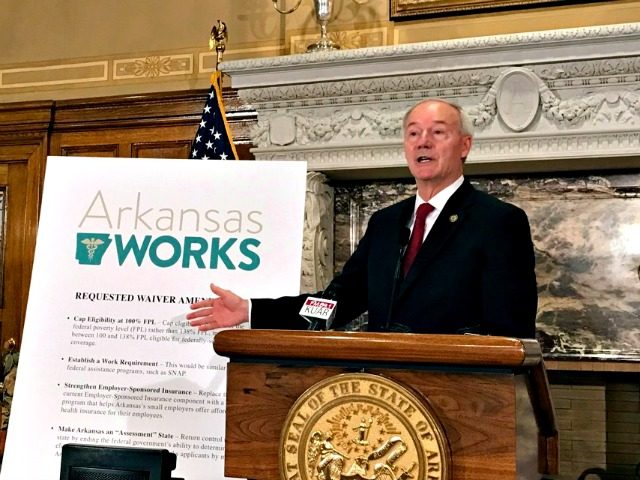Emboldened by the Trump administration, several states seek conservative reforms to Medicaid, including work requirements and drug testing.
“The philosophy is: We want to move people up the economic ladder,” Arkansas Gov. Asa Hutchinson said.
Governors Hutchinson (R-AR) and Scott Walker (R-WI) remain confident that the Trump administration will permit states to reform Medicaid by requiring job training or employment in return for Medicaid. The Obama adminstration consistently rejected work requirements for Medicaid.
In March, Health and Human Services (HHS) Secretary Tom Price and Centers for Medicare and Medicaid Administrator Seema Verma sent a letter to governors that stated: “We wish to empower all states to advance the next wave of innovative solutions to Medicaid’s challenges.”
Governor Hutchinson discussed his Medicaid work requirement proposal with HHS Secretary Price; Price said he was “very favorable and supportive of this.” Hutchinson’s waiver would require able-bodied adults without children to seek work.
Walker commented that he has spoken with Price about reforming BadgerCare, Wisconsin’s Medicaid program, “multiple times,” as well as with Vice President Mike Pence.
Walker holds an influential post as the chairman of the Republican Governors Association and will most likely spread his idea to include work requirements for Medicaid to other conservative states.
Many states already seek waivers for Medicaid to allow work requirements. Indiana encourages its Medicaid recipients to obtain job training or gainful employment. In its newest waiver, Indiana will likely require employment for Medicaid. Arizona will seek a five-year limit on Medicaid benefits, work requirements for Medicaid recipients, and monthly premiums for Arizonians below the poverty line.
Kentucky might become the first victory for conservative states hoping to reform Medicaid. Republican Governor Matt Bevin pledged to end Medicaid expansion. In 2016, Kentucky sent a waiver request to the Obama administration allowing the state to charge small monthly premiums for Kentuckians below the poverty line, a measure that Wisconsin and Maine want to adopt. If Kentucky Medicaid recipients fail to pay the Medicaid premium after 60 days, then the citizen would no longer be eligible for Medicaid. The Obama administration did not finish reviewing Kentucky’s waiver request. the Trump White House will have the final decision.
Tarren Bragdon, president and CEO of the Foundation for Government Accountability, said it is important “to think of Medicaid as not just a health-care program but also a welfare program. I think that’s where you see a lot of emphasis of work requirements within Medicaid.”
Governor Walker said that social safety net programs should lift people up rather than trapping them in a cycle of poverty.
“We should treat public assistance more like a trampoline than a hammock,” Walker explained.

COMMENTS
Please let us know if you're having issues with commenting.